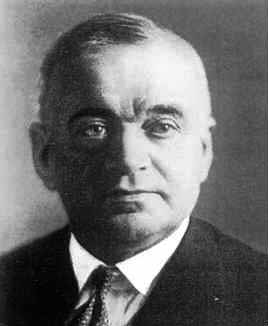
Karl Rudolf Fueter
 المؤلف:
J J Burckhardt
المؤلف:
J J Burckhardt
 المصدر:
Biography in Dictionary of Scientific Biography
المصدر:
Biography in Dictionary of Scientific Biography
 الجزء والصفحة:
...
الجزء والصفحة:
...
 27-5-2017
27-5-2017
 817
817
Born: 30 June 1880 in Basel, Switzerland
Died: 9 August 1950 in Brunnen, Switzerland

Rudolf Fueter's father was Eduard Rudolf Fueter, who was an architect, and his mother was Adèle Gelzer. Rudolf studied in his home town of Basel before going to Göttingen in 1899 to study under Hilbert. He worked on quadratic number fields and his doctorate, supervised by Hilbert, was awarded in 1903 for a thesis entitled Der Klassenkörper der quadratischen Körper und die komplexe Multiplikation.
After obtaining his doctorate Fueter travelled to various European centres of mathematical activity. He spent some time in Paris, then in Vienna and finally went to London while pursuing his studies. He was then appointed as a lecturer at the University of Marburg in 1907, and at the Mining Academy in Clausthal before being appointed as professor of mathematics at Basel in 1908. On 1 March 1908 he had married Amélie von Heusinger. They would have one daughter.
Five years later, in 1913, Fueter left Basel to take the chair of mathematics at the Technical University of Karlsruhe, a post he only held for three years before moving to the chair at the University of Zurich. In [2] Burckhardt discusses the impact that Fueter had on the University of Zurich and demonstrates how he began the process of making it a cultural centre, even during a very difficult period of history.
Fueter's first major publication was Synthetische Zahlentheorie which he published in 1917 soon after taking up the chair at Zurich. The work was a very successful one, a third edition being published in 1950, the year of Fueter's death. He did important work on the class formula for number fields summarising his work on the class formula for abelian number fields over an imaginary quadratic base field in the two volume work Vorlesungen über die singulären Moduln und die komplexe Multiplikation der elliptischen Funktionen. The first of the two volumes was published in 1924, with the second following three years later.
Between the two volumes of Vorlesungen über die singulären Moduln und die komplexe Multiplikation der elliptischen Funktionen Fueter published another major work, Das mathematische Werkzeug des Chemikers, biologen und Statistikers which was first published in 1926 and also ran to three editions, the third in 1947.
Fueter was a cofounder of the Swiss Mathematical Society, which came into existence in 1910, becoming its first President. He also became Rector of the University of Zurich serving in this role during 1920-22. As a member of the Swiss Natural Science Society he served as an editor on the major project to publish the complete works of Euler. In addition he undertook other editorial work such at the editorship of Comentarii Mathematici Helvetici.
Perhaps surprisingly Fueter also held the rank of colonel in the artillery of the Swiss army. The fact that Switzerland was neutral did not mean that the Swiss did nothing as Hitler came to power and the prospects of war became imminent. On the contrary they prepared themselves
psychologically, economically, and militarily for involvement in a possible war.
From the outbreak of World War II Fueter served in the Department of Press and Radio and was noted for his strong opposition to the Nazis. Despite being surrounded by Nazi and fascist controlled countries, Switzerland remained the only democratic state in central Europe and Fueter played an important role in that process. Kimche writes in [3]:-
Fueter restated the democratic rights of the press in almost classical form ... In his report of April 10, 1940 ... Fueter developed his argument more fully. "If is the duty of our press to reject the domestic and foreign policies of the National Socialists both clearly and forcefully."
- J J Burckhardt, Biography in Dictionary of Scientific Biography (New York 1970-1990).
http://www.encyclopedia.com/doc/1G2-2830901544.html
Books:
- J J Burckhardt, Die Mathematik an der Universität Zurich 1916-1950 unter den Professoren R Fueter, A Speiser und P Finsler (Basel, 1980).
- J Kimche, Spying for peace (London, 1961)
Articles:
- J J Burckhardt, Obituary : Rudolf Fueter, Vierteljschr. Naturforsch. Ges. Zurich 95 (1950), 284-287.
- A Speiser, Obituary : Rudolf Fueter, Element der Mathematik 5 (1950), 98-99.
 الاكثر قراءة في 1880to1884
الاكثر قراءة في 1880to1884
 اخر الاخبار
اخر الاخبار
اخبار العتبة العباسية المقدسة


